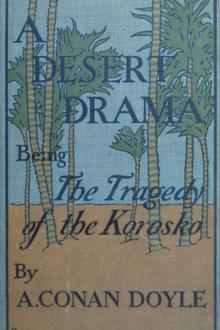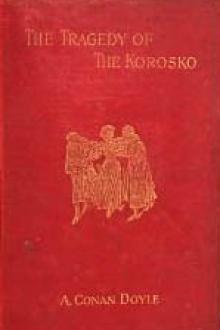A Desert Drama - Arthur Conan Doyle (snow like ashes series .txt) 📗

- Author: Arthur Conan Doyle
- Performer: -
Book online «A Desert Drama - Arthur Conan Doyle (snow like ashes series .txt) 📗». Author Arthur Conan Doyle
“What's that they have in the middle of them?” cried Stephens at last. “Look, Miss Adams! Surely it is a woman!”
There was something there upon a camel, but it was difficult to catch a glimpse of it. And then suddenly, as the two bodies met, the riders opened out, and they saw it plainly. “It's a white woman!” “The steamer has been taken!” Belmont gave a cry that sounded high above everything.
“Norah, darling,” he shouted, “keep your heart up! I'm here, and it is all well!”
CHAPTER VI
So the Korosko had been taken, and the chances of rescue upon which they had reckoned—all those elaborate calculations of hours and distances—were as unsubstantial as the mirage which shimmered upon the horizon. There would be no alarm at Haifa until it was found that the steamer did not return in the evening. Even now, when the Nile was only a thin green band upon the farthest horizon, the pursuit had probably not begun. In a hundred miles or even less they would be in the Dervish country. How small, then, was the chance that the Egyptian forces could overtake them. They all sank into a silent, sulky despair, with the exception of Belmont, who was held back by the guards as he strove to go to his wife's assistance.
The two bodies of camel-men had united, and the Arabs, in their grave, dignified fashion, were exchanging salutations and experiences, while the negroes grinned, chattered, and shouted, with the careless good-humour which even the Koran has not been able to alter. The leader of the new-comers was a greybeard, a worn, ascetic, high-nosed old man, abrupt and fierce in his manner, and soldierly in his bearing. The dragoman groaned when he saw him, and flapped his hands miserably with the air of a man who sees trouble accumulating upon trouble.
“It is the Emir Abderrahman,” said he. “I fear now that we shall never come to Khartoum alive.”
The name meant nothing to the others, but Colonel Cochrane had heard of him as a monster of cruelty and fanaticism, a red-hot Moslem of the old fighting, preaching dispensation, who never hesitated to carry the fierce doctrines of the Koran to their final conclusions. He and the Emir Wad Ibrahim conferred gravely together, their camels side by side, and their red turbans inclined inwards, so that the black beard mingled with the white one. Then they both turned and stared long and fixedly at the poor, head-hanging huddle of prisoners. The younger man pointed and explained, while his senior listened with a sternly impassive face.
“Who's that nice-looking old gentleman in the white beard?” asked Miss Adams, who had been the first to rally from the bitter disappointment.
“That is their leader now,” Cochrane answered.
“You don't say that he takes command over that other one?”
“Yes, lady,” said the dragoman; “he is now the head of all.”
“Well, that's good for us. He puts me in mind of Elder Mathews, who was at the Presbyterian Church in minister Scott's time. Anyhow, I had rather be in his power than in the hands of that black-haired one with the flint eyes. Sadie, dear, you feel better now its cooler, don't you?”
“Yes, Auntie; don't you fret about me. How are you yourself?”
“Well, I'm stronger in faith than I was.
“They haven't hurt you, Norah, have they?”
“I set you a poor example, Sadie, for I was clean crazed at first at the suddenness of it all, and at thinking of what your mother, who trusted you to me, would think about it. My land, there'll be some headlines in the Boston Herald over this! I guess somebody will have to suffer for it.”
“Poor Mr. Stuart!” cried Sadie, as the monotonous, droning voice of the delirious man came again to their ears. “Come, Auntie, and see if we cannot do something to relieve him.”
“I'm uneasy about Mrs. Shlesinger and the child,” said Colonel Cochrane. “I can see your wife, Belmont, but I can see no one else.”
“They are bringing her over,” cried he. “Thank God! We shall hear all about it. They haven't hurt you, Norah, have they?” He ran forward to grasp and kiss the hand which his wife held down to him as he helped her from the camel.
The kind, grey eyes and calm, sweet face of the Irishwoman brought comfort and hope to the whole party. She was a devout Roman Catholic, and it is a creed which forms an excellent prop in hours of danger. To her, to the Anglican Colonel, to the Nonconformist minister, to the Presbyterian American, even to the two Pagan black riflemen, religion in its various forms was fulfilling the same beneficent office,—whispering always that the worst which the world can do is a small thing, and that, however harsh the ways of Providence may seem, it is, on the whole, the wisest and best thing for us that we should go cheerfully whither the Great Hand guides us. They had not a dogma in common, these fellows in misfortune, but they held the intimate, deep-lying spirit, the calm, essential fatalism which is the world-old framework of religion, with fresh crops of dogmas growing like ephemeral lichens upon its granite surface.
“You poor things,” she said. “I can see that you have had a much worse time than I have. No, really, John, dear, I am quite well,—not even very thirsty, for our party filled their waterskins at the Nile, and they let me have as much as I wanted. But I don't see Mr. Headingly and Mr. Brown. And poor Mr. Stuart,—what a state he has been reduced to!”
“Headingly and Brown are out of their troubles,” her husband answered. “You don't know how often I have thanked God to-day, Norah, that you were not with us. And here you are, after all.”
“Where should I be but by my husband's side? I had much, much rather be here than safe at Haifa.”
“Has any news gone to the town?” asked the Colonel.
“One boat escaped. Mrs. Shlesinger and her child and maid were in it. I was downstairs in my cabin when the Arabs rushed on to the vessel. Those on deck had time to escape, for the boat was alongside. I don't know whether any of them were hit. The Arabs fired at them for some time.”
“Did they?” cried Belmont, exultantly, his responsive Irish nature catching the sunshine in an instant. “Then, be Jove, we'll do them yet, for the garrison must have heard the firing. What d'ye think, Cochrane? They must be full cry upon our scent this four hours. Any minute we might see the white puggaree of a British officer coming over that rise.”
But disappointment had left the Colonel cold and sceptical.
“They need not come at all unless they come strong,” said he. “These fellows are picked men with good leaders, and on their own ground they will take a lot of beating.” Suddenly he paused and looked at the Arabs. “By George!” said he, “that's a sight worth seeing!”
The great red sun was down with half its disc slipped behind the violet bank upon the horizon. It was the hour of Arab prayer. An older and more learned civilisation would have turned to that magnificent thing upon the skyline and adored that. But these wild children of the desert were nobler in essentials than the polished Persian. To them the ideal was higher than the material, and it was with their backs to the sun and their faces to the central shrine of their religion that they prayed. And how they prayed, these fanatical Moslems! Wrapt, absorbed, with yearning eyes and shining faces, rising, stooping, grovelling with their foreheads upon their praying carpets. Who could doubt, as he watched their strenuous, heart-whole devotion, that here was a great living power in the world, reactionary but tremendous, countless millions all thinking as one from Cape Juby to the confines of China? Let a common wave pass over them, let a great soldier or organiser arise among them to use the grand material at his hand, and who shall say that this may not be the besom with which Providence may sweep the rotten, decadent, impossible, half-hearted south of Europe, as it did a thousand years ago, until it makes room for a sounder stock?
And now as they rose to their feet the bugle rang out, and the prisoners understood that, having travelled all day, they were fated to travel all night also. Belmont groaned, for he had reckoned upon the pursuers catching them up before they left this camp. But the others had already got into the way of accepting the inevitable. A flat Arab loaf had been given to each of them—what effort of the chef of the post-boat had ever tasted like that dry brown bread?—and then, luxury of luxuries, they had a second ration of a glass of water, for the fresh-filled bags of the new-comers had provided an ample supply. If the body would but follow the lead of the soul as readily as the soul does that of the body, what a heaven the earth might be! Now, with their base material wants satisfied for the instant, their spirits began to sing within them, and they mounted their camels with some sense of the romance of their position. Mr. Stuart remained babbling upon the ground, and the Arabs made no effort to lift him into his saddle. His large, white, upturned face glimmered through the gathering darkness.
“Hi, dragoman, tell them that they are forgetting Mr. Stuart,” cried the Colonel.
“No use, sir,” said Mansoor. “They say that he is too fat, and that they will not take him any farther. He will die, they say, and why should they trouble about him?”
“Not take him!” cried Cochrane. “Why, the man will perish of hunger and thirst. Where's the Emir? Hi!” he shouted, as the black-bearded Arab passed, with a tone like that in which he used to summon a dilatory donkey-boy. The chief did not deign to answer him, but said something to one of the guards, who dashed the butt of his Remington into the Colonel's ribs.
The old soldier fell forward gasping, and was carried on half senseless, clutching at the pommel of his saddle. The women began to cry, and the men with muttered curses and clenched hands writhed in that hell of impotent passion, where brutal injustice and ill-usage have to go without check or even remonstrance. Belmont gripped at his hip-pocket for his little revolver, and then remembered that he had already given it to Miss Adams. If his hot hand had clutched it, it would have meant the death of the Emir and the massacre of the party.
And now as they rode onwards they saw one of the most singular of the phenomena of the Egyptian desert in front of them, though the ill treatment of their companion had left them in no humour for appreciating its beauty. When the sun had sunk, the horizon had remained of a slaty-violet hue. But now this began to lighten and to brighten until a curious false dawn developed, and it seemed as if a vacillating sun was coming back along the path which it had just abandoned. A rosy pink hung over the west, with beautifully delicate sea-green tints along the upper edge of it. Slowly these faded into slate again, and the night had come. It was but twenty-four hours since they had sat in their canvas chairs discussing politics by starlight on the saloon deck of the Korosko; only twelve since





Comments (0)